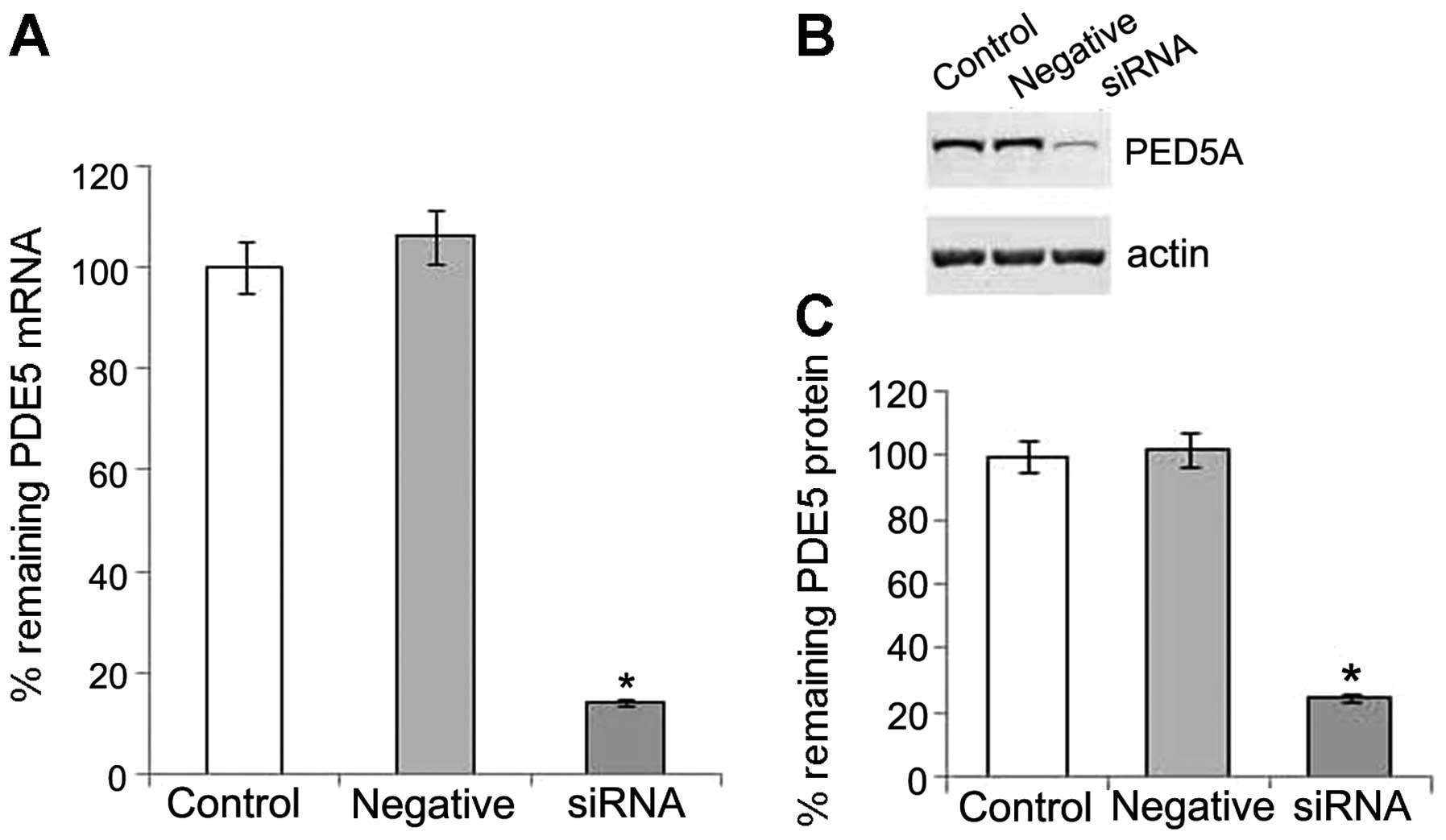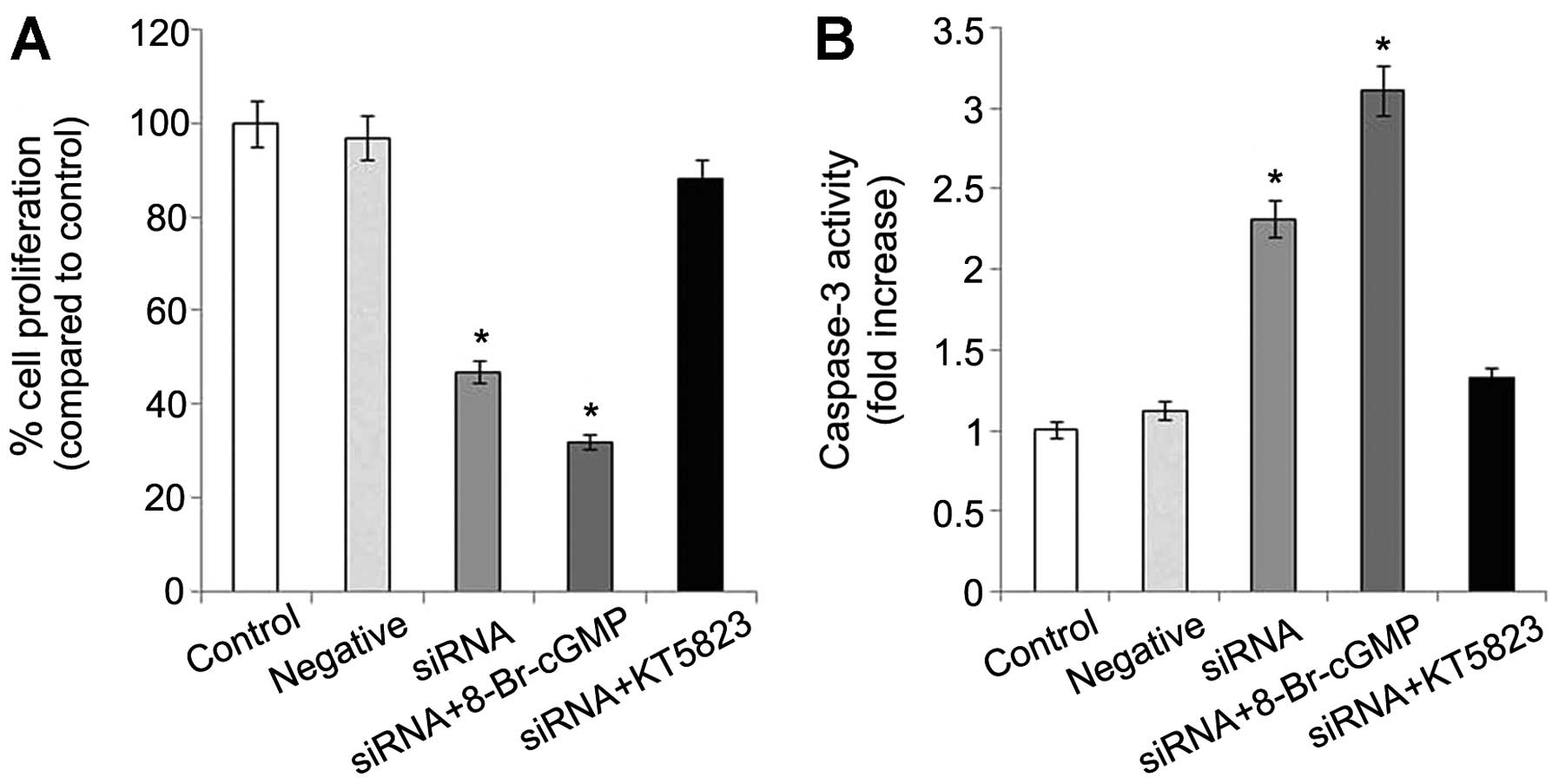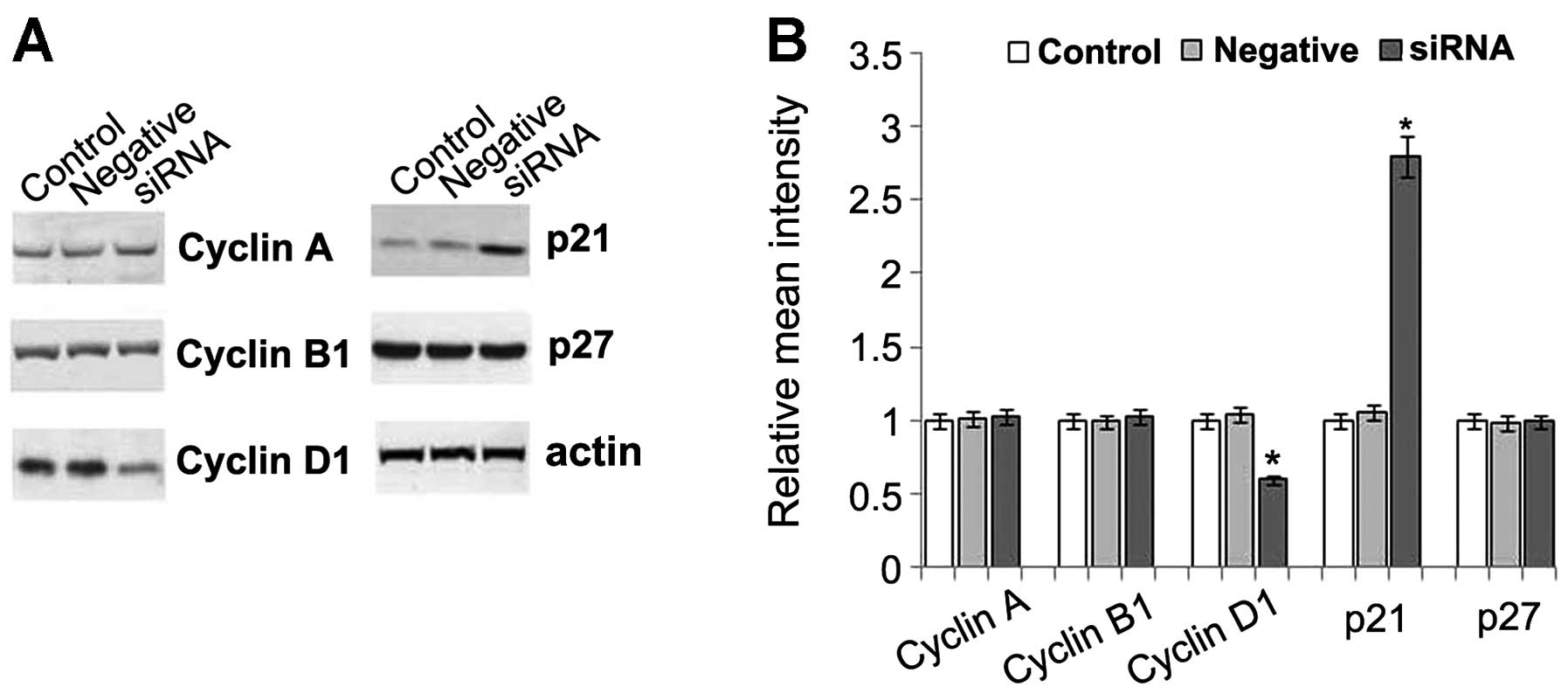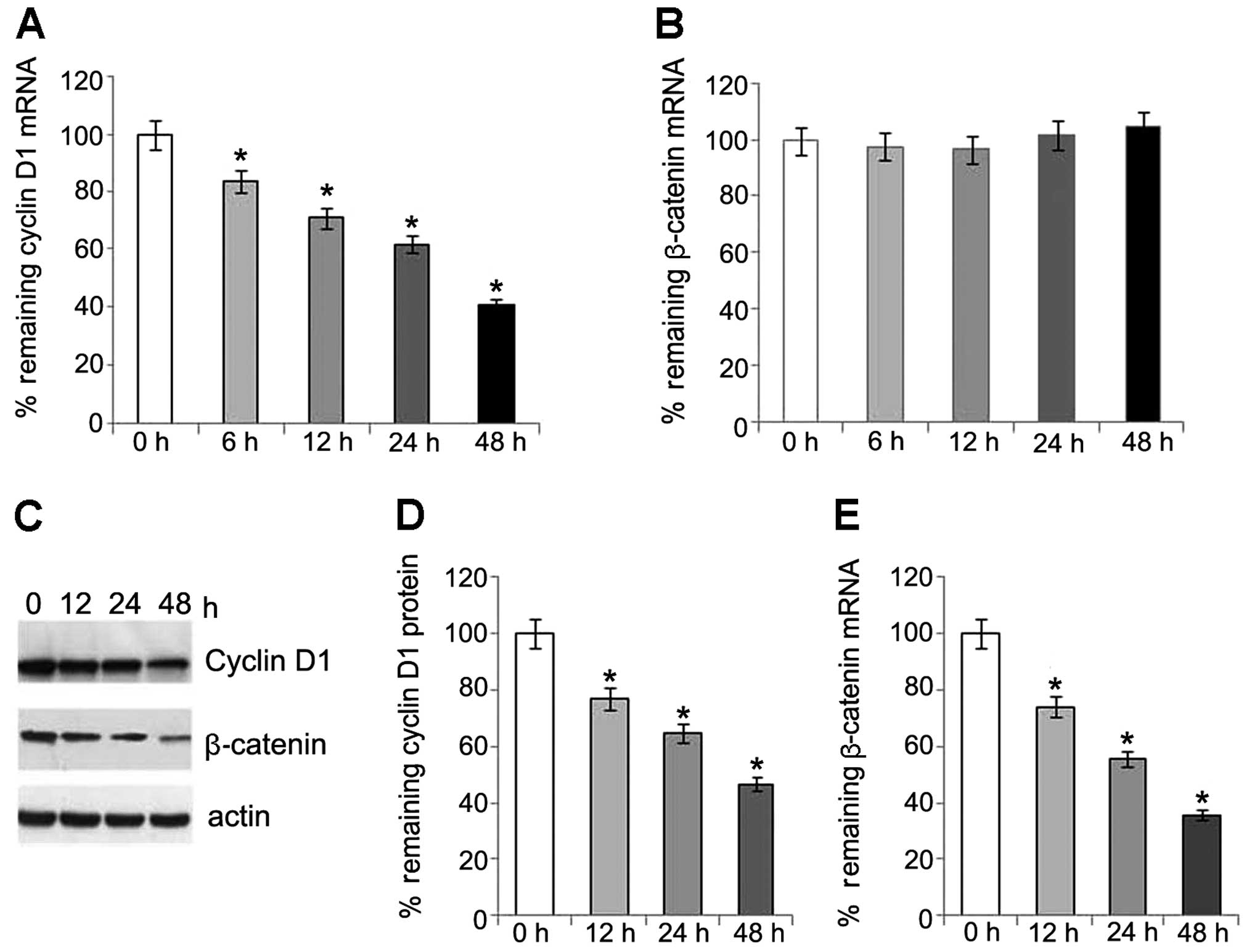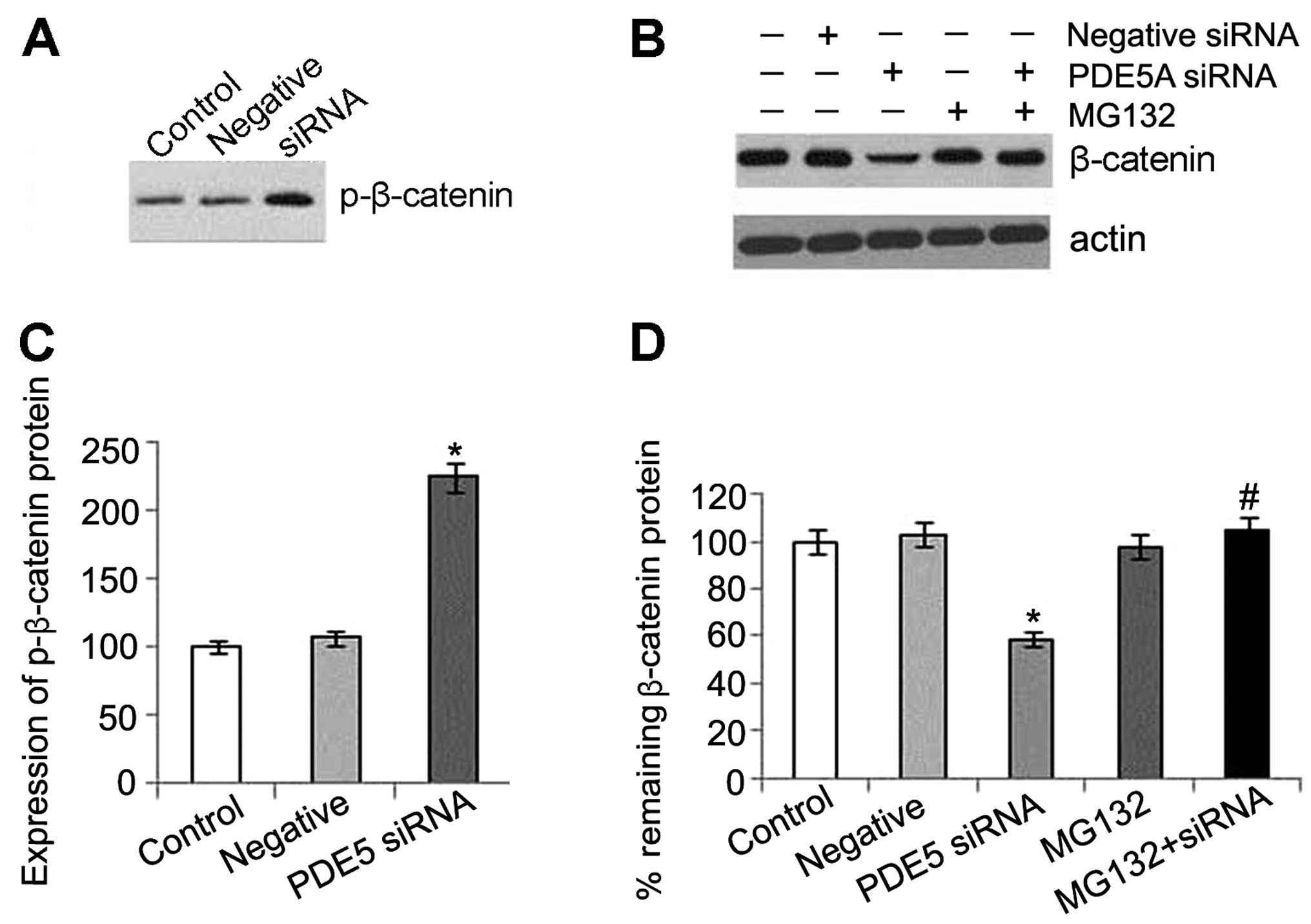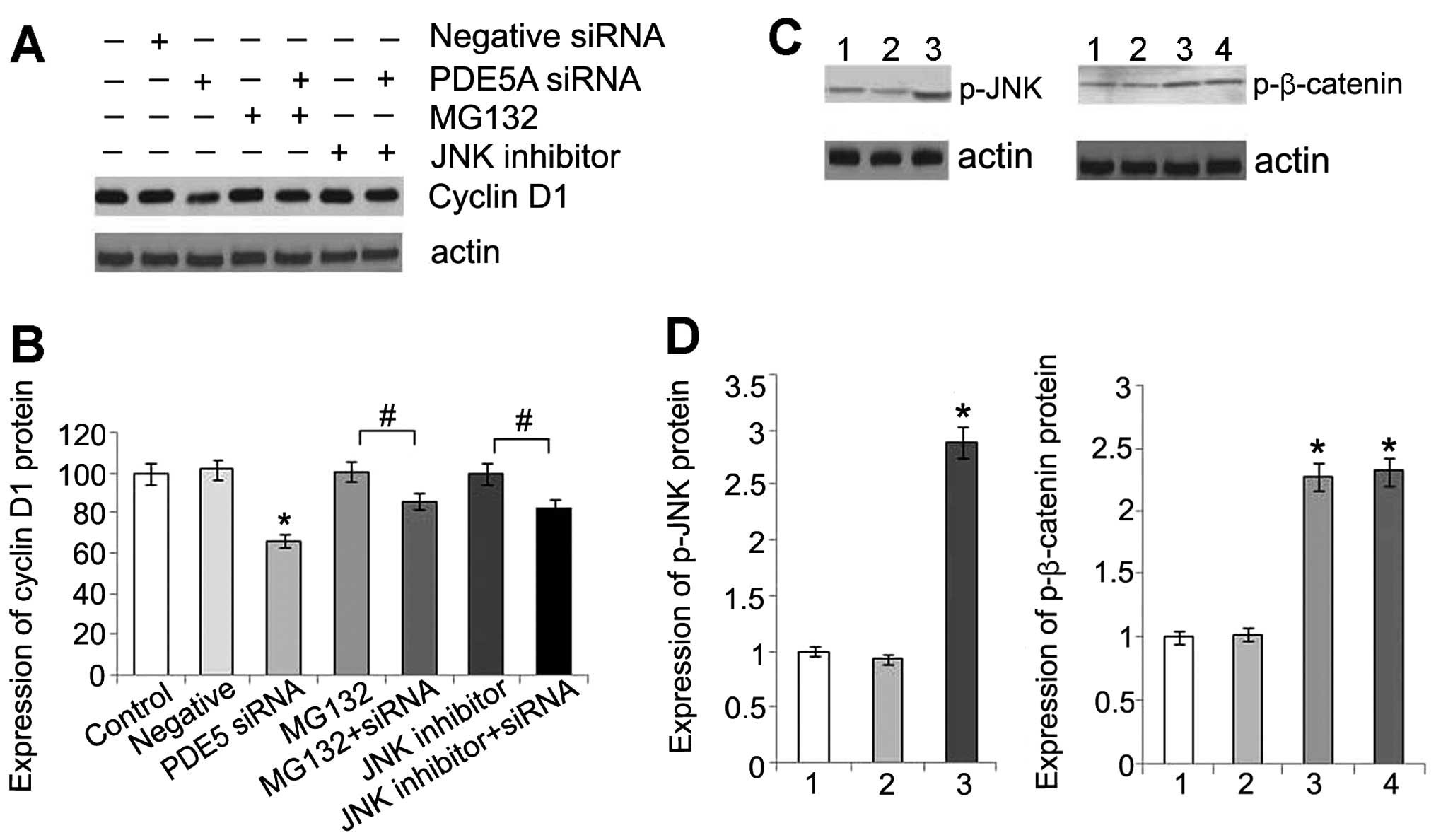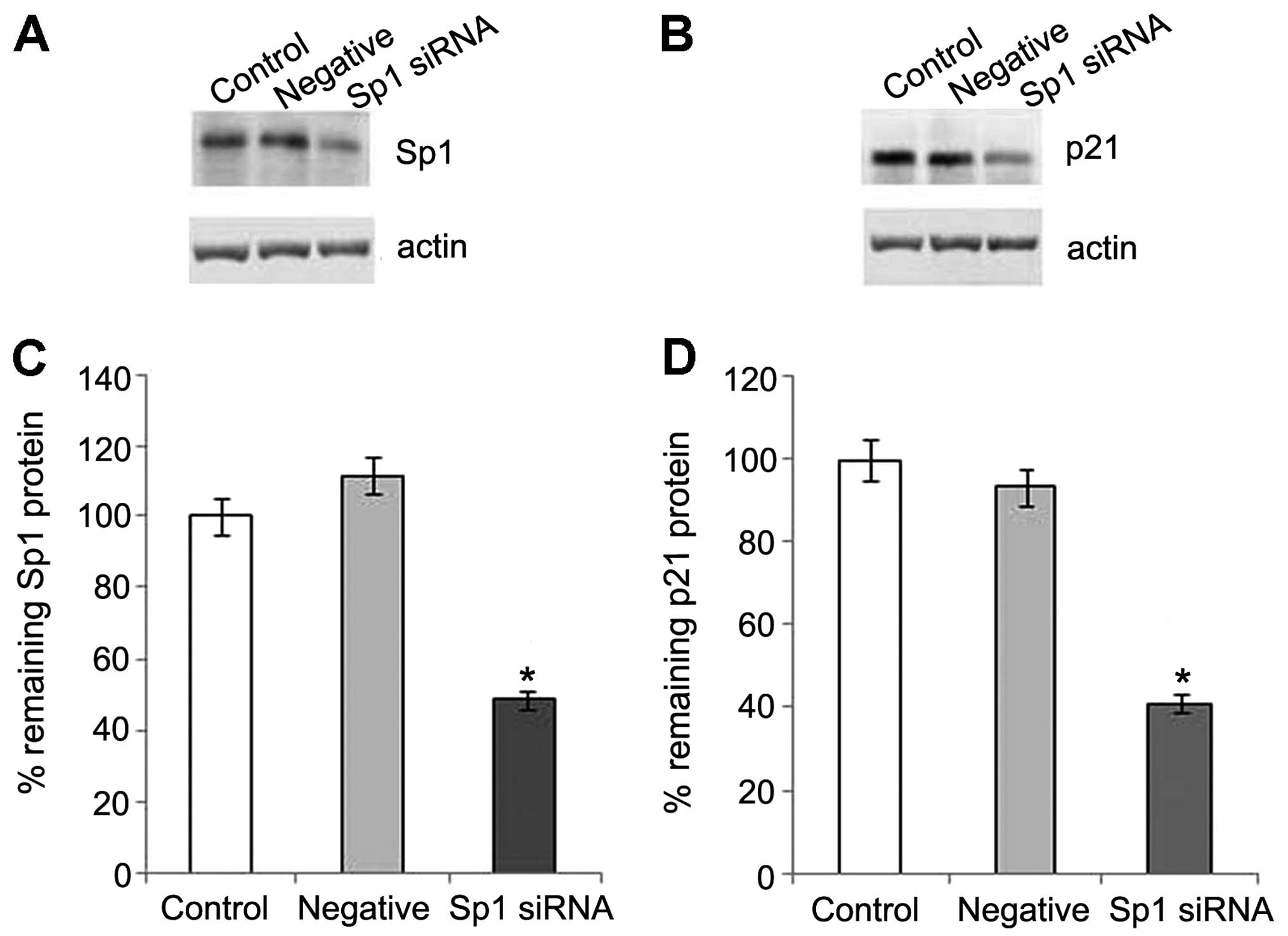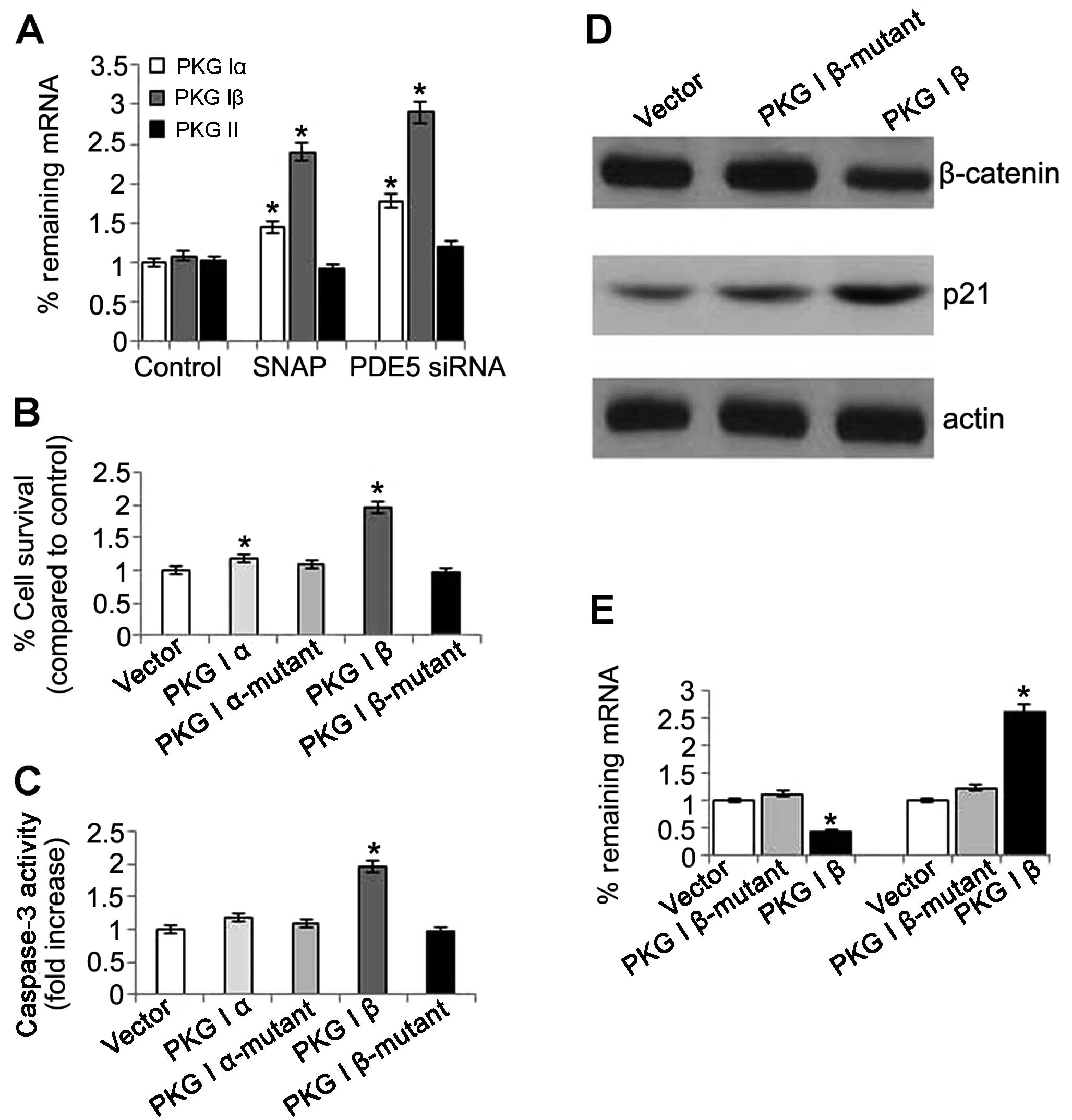|
1
|
Rini BI, Rathmell WK and Godley P: Renal
cell carcinoma. Curr Opin Oncol. 20:300–306. 2008. View Article : Google Scholar
|
|
2
|
Escudier B: Chemo-immunotherapy in RCC:
the end of a story. Lancet. 375:613–614. 2010. View Article : Google Scholar : PubMed/NCBI
|
|
3
|
Mulders PF, Brouwers AH, Hulsbergen-van
der Kaa CA, et al: Guideline ‘Renal cell carcinoma’. Ned Tijdschr
Geneeskd. 152:376–380. 2008.(In Dutch).
|
|
4
|
Zhu B and Strada SJ: The novel functions
of cGMP-specific phosphodiesterase 5 and its inhibitors in
carcinoma cells and pulmonary/cardiovascular vessels. Curr Top Med
Chem. 7:437–454. 2007. View Article : Google Scholar : PubMed/NCBI
|
|
5
|
Thompson WJ, Piazza GA, Li H, et al:
Exisulind induction of apoptosis involves guanosine 3′,5′-cyclic
monophosphate phosphodiesterase inhibition, protein kinase G
activation, and attenuated beta-catenin. Cancer Res. 60:3338–3342.
2000.PubMed/NCBI
|
|
6
|
Piazza GA, Thompson WJ, Pamukcu R, et al:
Exisulind, a novel proapoptotic drug, inhibits rat urinary bladder
tumorigenesis. Cancer Res. 61:3961–3968. 2001.PubMed/NCBI
|
|
7
|
Zhu B, Vemavarapu L, Thompson WJ and
Strada SJ: Suppression of cyclic GMP-specific phosphodiesterase 5
promotes apoptosis and inhibits growth in HT29 cells. J Cell
Biochem. 94:336–350. 2005. View Article : Google Scholar : PubMed/NCBI
|
|
8
|
Lim JT, Piazza GA, Han EK, et al: Sulindac
derivatives inhibit growth and induce apoptosis in human prostate
cancer cell lines. Biochem Pharmacol. 58:1097–1107. 1999.
View Article : Google Scholar : PubMed/NCBI
|
|
9
|
Tinsley HN, Gary BD, Keeton AB, et al:
Sulindac sulfide selectively inhibits growth and induces apoptosis
of human breast tumor cells by phosphodiesterase 5 inhibition,
elevation of cyclic GMP, and activation of protein kinase G. Mol
Cancer Ther. 8:3331–3340. 2009. View Article : Google Scholar
|
|
10
|
Tinsley HN, Gary BD, Keeton AB, et al:
Inhibition of PDE5 by sulindac sulfide selectively induces
apoptosis and attenuates oncogenic Wnt/beta-catenin-mediated
transcription in human breast tumor cells. Cancer Prev Res (Phila).
4:1275–1284. 2011. View Article : Google Scholar
|
|
11
|
Tetsu O and McCormick F: Beta-catenin
regulates expression of cyclin D1 in colon carcinoma cells. Nature.
398:422–426. 1999. View
Article : Google Scholar : PubMed/NCBI
|
|
12
|
Li H, Liu L, David ML, et al:
Pro-apoptotic actions of exisulind and CP461 in SW480 colon tumor
cells involve beta-catenin and cyclin D1 downregulation. Biochem
Pharmacol. 64:1325–1336. 2002. View Article : Google Scholar : PubMed/NCBI
|
|
13
|
Livak KJ and Schmittgen TD: Analysis of
relative gene expression data using real-time quantitative PCR and
the 2(-Delta Delta C(T)) method. Methods. 25:402–408. 2001.
View Article : Google Scholar : PubMed/NCBI
|
|
14
|
Deguchi A, Thompson WJ and Weinstein IB:
Activation of protein kinase G is sufficient to induce apoptosis
and inhibit cell migration in colon cancer cells. Cancer Res.
64:3966–3973. 2004. View Article : Google Scholar : PubMed/NCBI
|
|
15
|
Carlson B, Lahusen T, Singh S, et al:
Downregulation of cyclin D1 by transcriptional repression in MCF-7
human breast carcinoma cells induced by flavopiridol. Cancer Res.
59:4634–4641. 1999.PubMed/NCBI
|
|
16
|
Liu L, Li H, Underwood T, et al: Cyclic
GMP-dependent protein kinase activation and induction by exisulind
and CP461 in colon tumor cells. J Pharmacol Exp Ther. 299:583–592.
2001.PubMed/NCBI
|
|
17
|
Kwon IK, Wang R, Thangaraju M, et al: PKG
inhibits TCF signaling in colon cancer cells by blocking
beta-catenin expression and activating FOXO4. Oncogene.
29:3423–3434. 2010. View Article : Google Scholar : PubMed/NCBI
|
|
18
|
Soh JW, Mao Y, Kim MG, et al: Cyclic GMP
mediates apoptosis induced by sulindac derivatives via activation
of c-Jun NH2-terminal kinase 1. Clin Cancer Res. 6:4136–4141.
2000.PubMed/NCBI
|
|
19
|
Hofmann F: The biology of cyclic
GMP-dependent protein kinases. J Biol Chem. 280:1–4. 2005.
View Article : Google Scholar : PubMed/NCBI
|
|
20
|
Das A, Xi L and Kukreja RC: Protein kinase
G-dependent cardioprotective mechanism of phosphodiesterase-5
inhibition involves phosphorylation of ERK and GSK3beta. J Biol
Chem. 283:29572–29585. 2008. View Article : Google Scholar : PubMed/NCBI
|
|
21
|
Peruzzi B and Bottaro DP: Beta-catenin
signaling: linking renal cell carcinoma and polycystic kidney
disease. Cell Cycle. 5:2839–2841. 2006. View Article : Google Scholar : PubMed/NCBI
|
|
22
|
Thompson MD and Monga SP: WNT/beta-catenin
signaling in liver health and disease. Hepatology. 45:1298–1305.
2007. View Article : Google Scholar : PubMed/NCBI
|
|
23
|
Chesire DR and Isaacs WB: Beta-catenin
signaling in prostate cancer: an early perspective. Endocr Relat
Cancer. 10:537–560. 2003. View Article : Google Scholar : PubMed/NCBI
|
|
24
|
Stein U, Arlt F, Smith J, et al:
Intervening in beta-catenin signaling by sulindac inhibits
S100A4-dependent colon cancer metastasis. Neoplasia. 13:131–144.
2011.PubMed/NCBI
|
|
25
|
Li H, Pamukcu R and Thompson WJ:
beta-Catenin signaling: therapeutic strategies in oncology. Cancer
Biol Ther. 1:621–625. 2002. View
Article : Google Scholar : PubMed/NCBI
|
|
26
|
Ueda M, Gemmill RM, West J, et al:
Mutations of the beta-and gamma-catenin genes are uncommon in human
lung, breast, kidney, cervical and ovarian carcinomas. Br J Cancer.
85:64–68. 2001. View Article : Google Scholar : PubMed/NCBI
|
|
27
|
Tarmin L, Yin J, Harpaz N, et al:
Adenomatous polyposis coli gene mutations in ulcerative
colitis-associated dysplasias and cancers versus sporadic colon
neoplasms. Cancer Res. 55:2035–2038. 1995.PubMed/NCBI
|
|
28
|
Lewis A, Davis H, Deheragoda M, et al: The
C-terminus of Apc does not influence intestinal adenoma development
or progression. J Pathol. 226:73–83. 2012. View Article : Google Scholar : PubMed/NCBI
|
|
29
|
Whitehead CM, Earle KA, Fetter J, et al:
Exisulind-induced apoptosis in a non-small cell lung cancer
orthotopic lung tumor model augments docetaxel treatment and
contributes to increased survival. Mol Cancer Ther. 2:479–488.
2003.PubMed/NCBI
|
|
30
|
Saikawa Y, Kubota T, Otani Y, et al:
Cyclin D1 antisense oligonucleotide inhibits cell growth stimulated
by epidermal growth factor and induces apoptosis of gastric cancer
cells. Jpn J Cancer Res. 92:1102–1109. 2001. View Article : Google Scholar : PubMed/NCBI
|















